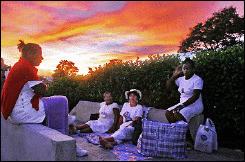 |
|
|
Posted: 07 October 2004 0224 hrs
Dissidents' kin stage rare public protest in Cuba's Revolution Square
| World News » | ||||||
|
Time is GMT + 8
hours Posted: 07 October 2004 0224 hrs Dissidents' kin stage rare public protest in Cuba's Revolution Square |
|||||
"It is the right thing to do at a time like this," Marta Beatriz Roque, a prominent dissident economist and the only woman arrested and jailed in the crackdown, told AFP. She was released early suffering from health troubles. "It seems to me that it is time to move past reporting things, issuing letters, and move from written words to active deeds," in defense of the dissidents, who "are more and more harassed every day," Roque charged. Demonstrators have numbered fewer than 15 but "if this starts getting serious, if more dissidents come, if people start wondering why we are here, and find out, then I think there will be repressive action," Roque said. To most Cubans who have access only to state-run media, the dissidents are unknown faces. But "when people see something like this, with women and things on the ground, they will ask what is going on," she added. The women, demonstrating not far from the towering portrait of revolutionary hero Ernesto "Che" Guevara that overlooks the square, said they were concerned about Moya's health and asked for him to be transferred to a civilian hospital for surgery they say he needs on his spine. His condition has left him him unable to walk, his wife Berta Soler Fernandez said. Moya, who is serving his term at Los Mangos prison in the eastern province of Granma, "is living stretched out on a little cot," she charged. "We are staying here until the end, until we get an answer," Soler Fernandez told AFP late Tuesday. The group, seated on blankets amid a clutter of personal belongings, stayed on through the night without incident. At night and on Wednesday the women heard encouraging words from dissidents who paid visits to the high-profile scene, within sight of government offices and in an area tourists often visit and photograph. The crackdown, the harshest in years in the Americas' only one-party communist state, prompted an international outcry and drove a rift between Cuba and the European Union, while further raising tensions with the United States and other countries. Castro has led Cuba since 1959. Roque, a former leader of the Assembly for the Promotion of Civil Society, banned by the government, and who had also headed the Cuban Institute of Independent Economists, is among the best-known dissidents in the Caribbean nation of more than 11 million. She already had spent three years in jail between 1997 and 2000. Jailed dissident Enrique Ferrer Garcia, who is serving a 28-year term, has started a hunger strike "to the end," claiming he has been treated sadistically in prison, an associate said September 27. Garcia, 30, is the youngest of 75 dissidents who were jailed in the March-April, 2003 roundup after being accused of conspiring against Castro's government. Garcia was a coordinator for the Christian Liberation Movement (MCL), an illegal opposition group here, run by Oswaldo Paya, who was awarded the Sakharov Prize by the European Parliament in 2002 for defending human rights in Cuba. Paya is seeking economic and democratic change from within the current system, so far to no avail.
|